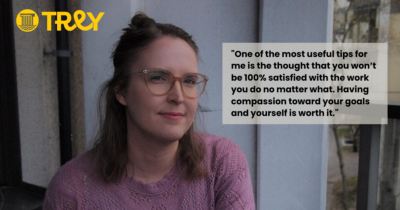This spring has been odd – and not only because coronavirus pandemic has tied us to our homes. For me this spring has been peculiar, because I took two months study leave to finalise my studies. In this blog I want to share my experiences on working during these special times. I hope that sharing my experiences could help others who are facing challenges related to the studies.
Hold on to what is important
As a student who has already started in the working life, I have been following my peers that have been working while studying. My friends have been thankful of flexible systems that enable studying. However, combining studying and working does not suit to everyone. We students are a diverse group and some of us might need more time to relax, to build social relations and to spend time with hobbies, such as being active in associations. I noticed that I need time for thinking that studying requires. Combining goal-directed studies with a full-time job was just too much for me. Taking study leave and working less hours during the working week was a better option for me. I could have free time I needed. I could also spend my weekends without thinking about my studies and I could meet my family and friends.
The support of the colleagues is crucial
The biggest surprise that the study leave brought was not related to the studies, but how I realized how important my working community is. Suddenly my daily working community was not around me, as I “moved” to the university library. I started my days in the library and I usually did not know anyone who was studying in the same space with me. I realised that I missed friendly faces and casual meetings that occurred naturally at the working place. I did not have many lectures during my study leave, which could have filled the lack of working community. However, I wanted to reserve time for my friends and social relations and that is why I was active in setting lunch meetings, coffee breaks and study circles. I went the extra mile to see my loved ones, even when it brought me feelings of guilt. I felt that the time was away from my Master’s thesis, for which I just got a lot of time.
How to be your own manager
During my studies I have been suffering from writer’s block from time to time. Writing has been difficult for me, because I find my texts imperfect and that prevents me from writing at all. I procrastinate and worry about what I am not doing, in other words I postpone my tasks until tomorrow, tomorrow and tomorrow… The snowball effect was around the corner also during my study leave. I felt guilty about being insecure about my writing, as I had just received study leave to write my thesis. I had set myself a high goal of finalising my thesis without realising how much time it requires. I only knew that a lot. I found a few good articles about procrastination on the internet and I also asked for tips for writing the Master’s thesis in the social media.

One recommendation I got was to start writing in the morning in a peaceful place and to list the objectives for the day. To-do-lists that include small steps that are needed for reaching bigger goals and deadlines. It was also important to reserve enough time for working on something and let yourself focus on one thing at a time. Intensive workflow during weekdays and having a few rejuvenating days off was something my friends found helpful for their recovery. Changing your work environment and study habits also proved beneficial. If my friend noticed that concentrating was incredibly challenging or no progress was done in twenty minutes they recommended doing something else. Going outside, having a coffee break and lunch meetings proved to be useful ways of breaking up ones routine. One useful tip was getting help with writing from ones supervisor regarding questions and comments. Supervision helped with setting goals, finding possible fixable shortcomings and enduring the harder times of the writing process.
Learning out from perfectionism
One of the most useful tips for me is the thought that you won’t be 100% satisfied with the work you do no matter what. Having compassion toward your goals and yourself is worth it. I wanted to think that I could finish a good enough of a masters thesis, which I could be satisfied in. My friend frightened me with the idea that my perfectionism would lead into me using most of my time finishing up the last 10% of my masters thesis. Nevertheless with the help of the tips I was given my thesis is almost ready to be submitted at the end of my study leave. Now after the last comments from my supervisor I will return my work next week. I am preparing day by day for a good enough of a life as a master.
– Jenny Vaara